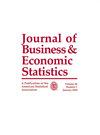High-Dimensional Dynamic Covariance Matrices With Homogeneous Structure
IF 2.9
2区 数学
Q1 ECONOMICS
引用次数: 10
Abstract
Abstract High-dimensional covariance matrices appear in many disciplines. Much literature has devoted to the research in high-dimensional constant covariance matrices. However, constant covariance matrices are not sufficient in applications, for example, in portfolio allocation, dynamic covariance matrices would be more appropriate. As argued in this article, there are two difficulties in the introduction of dynamic structures into covariance matrices: (1) simply assuming each entry of a covariance matrix is a function of time to introduce the dynamic needed would not work; (2) there is a risk of having too many unknowns to estimate due to the high dimensionality. In this article, we propose a dynamic structure embedded with a homogeneous structure. We will demonstrate the proposed dynamic structure makes more sense in applications and avoids, in the meantime, too many unknown parameters/functions to estimate, due to the embedded homogeneous structure. An estimation procedure is also proposed to estimate the proposed high-dimensional dynamic covariance matrices, and asymptotic properties are established to justify the proposed estimation procedure. Intensive simulation studies show the proposed estimation procedure works very well when the sample size is finite. Finally, we apply the proposed high-dimensional dynamic covariance matrices to portfolio allocation. It is interesting to see the resulting portfolio yields much better returns than some commonly used ones.具有齐次结构的高维动态协方差矩阵
高维协方差矩阵出现在许多学科中。大量文献对高维常协方差矩阵进行了研究。然而,在实际应用中,恒定的协方差矩阵是不够的,例如,在投资组合配置中,动态协方差矩阵会更合适。正如本文所讨论的,在协方差矩阵中引入动态结构有两个困难:(1)简单地假设协方差矩阵的每个条目是时间的函数来引入所需的动态是行不通的;(2)由于高维数,存在有太多未知数需要估计的风险。在本文中,我们提出了一种嵌入均匀结构的动态结构。我们将证明所提出的动态结构在应用中更有意义,同时避免了由于嵌入的同质结构而导致太多未知参数/函数需要估计。提出了一种估计方法来估计所提出的高维动态协方差矩阵,并建立了渐近性来证明所提出的估计方法。大量的仿真研究表明,所提出的估计方法在样本量有限的情况下效果很好。最后,我们将提出的高维动态协方差矩阵应用于投资组合配置。有趣的是,由此产生的投资组合比一些常用的投资组合产生了更好的回报。
本文章由计算机程序翻译,如有差异,请以英文原文为准。
求助全文
约1分钟内获得全文
求助全文
来源期刊

Journal of Business & Economic Statistics
数学-统计学与概率论
CiteScore
5.00
自引率
6.70%
发文量
98
审稿时长
>12 weeks
期刊介绍:
The Journal of Business and Economic Statistics (JBES) publishes a range of articles, primarily applied statistical analyses of microeconomic, macroeconomic, forecasting, business, and finance related topics. More general papers in statistics, econometrics, computation, simulation, or graphics are also appropriate if they are immediately applicable to the journal''s general topics of interest. Articles published in JBES contain significant results, high-quality methodological content, excellent exposition, and usually include a substantive empirical application.
 求助内容:
求助内容: 应助结果提醒方式:
应助结果提醒方式:


